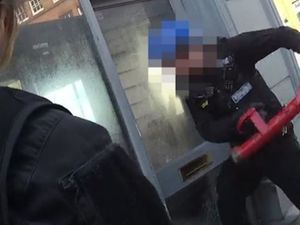West Mercia Police unveils amount of money it has paid to informers - but declines information on how many help the force
The latest figures showing the amount of money West Mercia Police has paid to informers over five years has been unveiled in a Freedom of Information request
Watch more of our videos on ShotsTV.com
and on Freeview 262 or Freely 565
West Mercia Police paid informers more than £200,000 over the last five years, a Freedom of Information request has revealed.
The force which covers Shropshire, Herefordshire and Worcestershire spent more than £55,000 in 2023-24 as part of a national “well-established and highly regulated tactic”.
The figures for 2024-25 aren’t yet available. But the latest figures from 2019 to 2024 show a total spend fo £200,979.
The figures have come to light following a request to the force from the Local Democracy Reporting Service.
West Mercia Police was also asked for the number of informers who have received payments during this period. They declined to answer this question, or even confirm that they hold the information.
Figures revealed the annual total breakdown of costs paid to the unidentified number of informers. These are:
2019/20: £38,792
2020/21: £20,719
2021/22: £40,337
2022/23: £45,592
2023/24: £55,539

In response to the second part of the question regarding the number of informers used by officres, the force said it had to “conduct a public interest test.”
In this they consider that the factors favouring disclosure include there being information within the public domain confirming that the police use Covert Human Intelligence Sources to assist them with investigations and the effective delivery of law enforcement.
“Disclosure would enhance the public understanding of how West Mercia Police use information relating to informants and how the intelligence received assists in day to day investigations, such as operations to support the prevention and detection of crime,” they said.
A part of a lengthy reply to the LDRS said that “disclosure would also assist in stopping any incorrect rumours or falsehoods relating to how the police store and manage how informants assist the police.”
But they balanced this against “factors favouring non-disclosure”
They said that “disclosure of the information requested could identify informant activity within a force area.
“Over a period of time, if several disclosures were made, individuals could analyse the information and identify any sudden peaks or troughs in informant activity.
“This would hinder the prevention and detection of crime and also prejudice the force’s ability to maintain confidential sources.
“Additionally, it would deter future informants from coming forward with invaluable information.”
Officers decided internally that “disclosure of this information would not materially advance the public interest as the information already in the public domain satisfies the public interest with regards to police funds and accountability.”
They add: “Those determined to identify informants will use small pieces of information to build a more complete picture and it is the cumulative effect of information disclosures that the Police Service feel could lead to this.”
'A vital role in assisting the police'
And they say that the use of informants, who play a “ vital role in assisting the police” are based “very much on relationships built on trust and the expectation of complete confidentiality.
“Disclosure of payments, at force level, on a financial year basis, satisfies the public interest in disclosure, and further breakdown of these figures by whatever means, would have a significant impact on retention, recruitment, operational vulnerability and identification.
“It is therefore our opinion that the balance lies in favour of non-disclosure of the information.”
The police added that “West Mercia Police can neither confirm nor deny that any other information is held, relevant to your request.”
They say that this is covered by FoI exemptions relating to security bodies, National Security, and investigations.
They add that the above quoted total payments to informants “does not include any payments made to informants where funding may have been supplied by exempt bodies.”
The force’s explanation also says: “To confirm or deny whether that West Mercia Police holds any additional information would allow inferences to be made about the nature and extent of national security related activities which may or may not take place in a given area.
“This could enable terrorist groups to take steps to avoid detection, and as such, confirmation or denial would be damaging to national security. By confirming or denying any policing arrangements of this nature would render national security measures less effective. This would lead to the compromise of ongoing or future operations to protect the security or infrastructure of the UK and increase the risk of harm to the public.”
'Strong guarantees' that informers identites are protected
West Mercia adds that the Police Service will never disclose information which could identify investigative activity and therefore undermine investigations. To do so would hinder the prevention and detection of crime.
The force also says that informants are “given strong guarantees that their identities will be protected.
“In some instances, a prosecution may be stopped rather than risk the identity, or in some cases even the existence, of a covert human intelligence source (CHIS) being revealed,” they say.
“We accept evidence as to the “paranoia” of those acting, or contemplating acting, as a CHIS and accept that they would view the disclosure of the disputed information as a breach of confidence that would significantly undermine their confidence in having their identities protected’.
“It is therefore my opinion that for these issues the balancing test for confirming or not whether any other information is held, is not made out.
“This should not be taken as an inference that there is or is not any further information held.”
A spokesperson for the National Police Chiefs’ Council said: “A wide range of tactics are available to policing in order to tackle crime and organised crime groups.
“The use of members of the public to provide intelligence (CHIS) to assist in investigations is one resource used by police forces across the country to defend and protect the public.
“The intelligence provided helps to prevent and solve the most serious of crimes and is vital in bringing offenders to justice through the courts.
“This is a well-established and highly regulated tactic with the money paid to CHIS being very closely scrutinised.”





